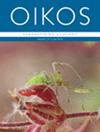全球植物入侵者的生态影响:利用元分析综合平均效应和方差效应
IF 3
2区 环境科学与生态学
Q2 ECOLOGY
引用次数: 0
摘要
外来入侵物种(IAS)是全球环境变化的主要驱动因素之一。据报道,外来入侵物种对生物多样性和生态系统的影响往往因物种、栖息地和环境背景的不同而存在很大差异,这限制了我们对其总体影响进行经验归纳的能力。迄今为止,荟萃分析仅使用平均效应来研究 IAS 对生态的影响,而方差效应--量化疗效或可推广性的一个同样重要的指标--在很大程度上仍被忽视。通过对 30 项研究中分别与平均效应和方差效应相关的 586 个和 522 个效应大小进行全球荟萃分析,我们首次对全球植物入侵者香蒲对物种、群落和生态系统层面相关生态变量的平均效应和方差效应的影响程度进行了定量综合分析。我们的研究结果表明,对于单个响应等级而言,物种入侵对其均值和方差的影响在程度和方向上都有很大差异,对大多数响应等级的影响是高度异质性和非显著性的。研究设计对物种入侵的平均效应和方差效应都有显著影响,但生态系统类型、大陆和纬度对平均效应和方差效应的预测作用较弱。通过调查平均效应和方差效应,我们的研究首次对一种全球问题入侵植物的生态影响进行了定量综合。基于我们的研究结果,我们强调了目前的知识差距,并提出了未来的研究方向,特别是需要关注入侵影响研究中的变异原因,以便有效管理和恢复入侵景观。本文章由计算机程序翻译,如有差异,请以英文原文为准。
Ecological impacts of a global plant invader: synthesizing mean and variance effects using meta‐analysis
Invasive alien species (IAS) are one amongst the dominant drivers of global environmental change. The reported effects of IAS on biodiversity and ecosystems are often highly variable across species, habitats, and environmental settings, which constrains our capacity to empirically generalise their overall impact. To date, meta‐analyses have investigated the ecological impacts of IAS using only mean effects, while variance effects – an equally important measure in quantifying the efficacy or generalizability of a treatment – has largely remained ignored. Using a global meta‐analysis of 586 and 522 effect sizes related to mean and variance measures respectively from 30 studies, here we provide the first quantitative synthesis of the extent to which a global plant invader Lantana camara affects the mean and variance of ecological variables relevant at species, community and ecosystem levels. Our results suggest that for individual response classes, both the mean and variance effects from the species invasion differed considerably in their magnitude and direction, with the effect on most response classes being highly heterogeneous and non‐significant. The study design had a significant effect on both the mean and variance effects from the species invasion, but the ecosystem type, continent, and latitude act as weak predictors of both mean and variance effects. By investigating both mean and variance effects, our study provides first quantitative synthesis on ecological impacts of a globally problematic invasive plant. Based on our findings, we highlight the current knowledge gaps and suggest future research directions, particularly the need to focus on causes of variance in invasion impact studies for effective management and restoration of invaded landscapes.
求助全文
通过发布文献求助,成功后即可免费获取论文全文。
去求助
来源期刊

Oikos
环境科学-生态学
CiteScore
6.20
自引率
5.90%
发文量
152
审稿时长
6-12 weeks
期刊介绍:
Oikos publishes original and innovative research on all aspects of ecology, defined as organism-environment interactions at various spatiotemporal scales, so including macroecology and evolutionary ecology. Emphasis is on theoretical and empirical work aimed at generalization and synthesis across taxa, systems and ecological disciplines. Papers can contribute to new developments in ecology by reporting novel theory or critical empirical results, and "synthesis" can include developing new theory, tests of general hypotheses, or bringing together established or emerging areas of ecology. Confirming or extending the established literature, by for example showing results that are novel for a new taxon, or purely applied research, is given low priority.
 求助内容:
求助内容: 应助结果提醒方式:
应助结果提醒方式:


